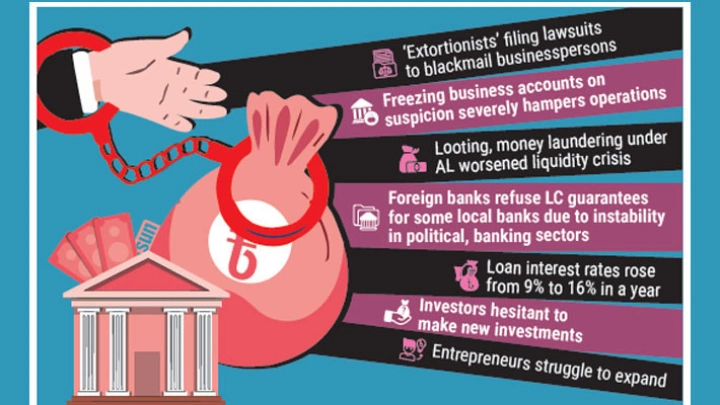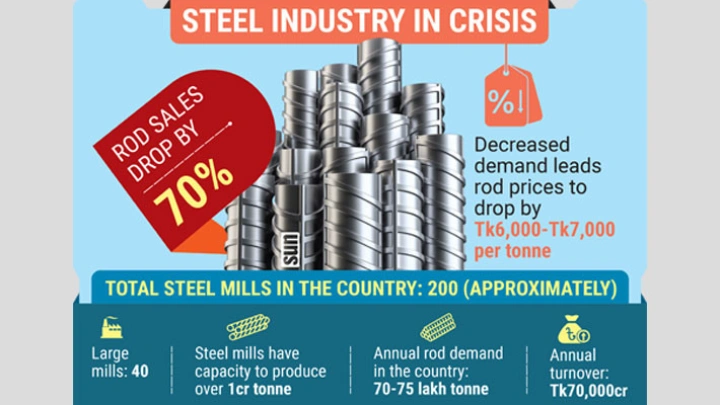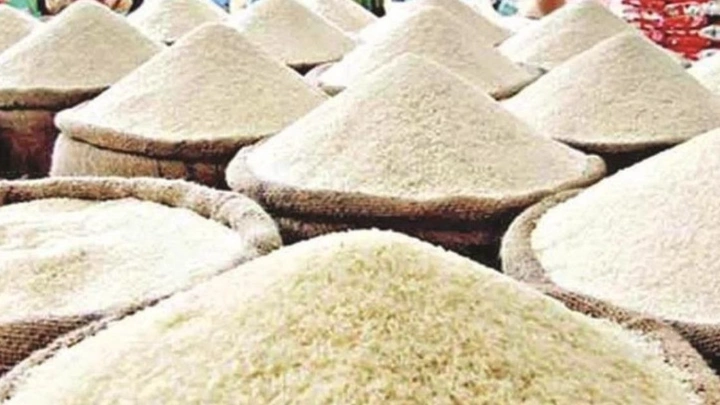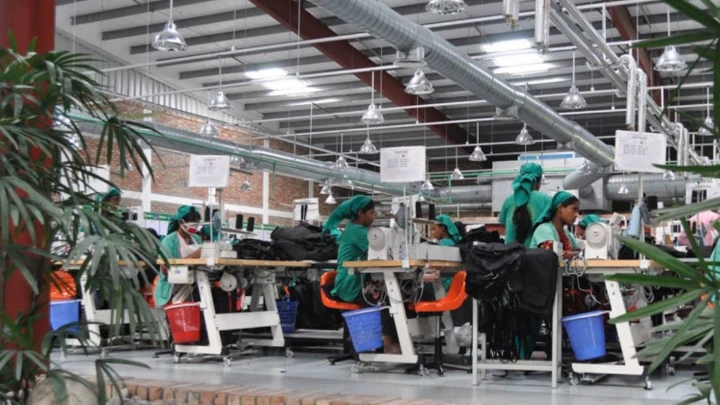AL corruption exposes genuine businesses to harassment
DailySun || Shining BD
Following the ouster of the Sheikh Hasina-led fascist government this August, immense malpractices encouraged by the Awami League (AL) were exposed.
While the AL systematically ruined many banks during its 15-year autocratic rule, it also laundered vast amounts of money abroad, leaving behind a trail of destruction, overcoming what appears to be a herculean task for the country’s current government as well as the entrepreneurs.
Many businesspersons have come under different investigating agencies’ scanners, apparently without violating any law. Some others are facing murder charges, many of which were baseless.
A number of businesspersons’ bank accounts have been frozen, which severely hampers the activities of companies where millions of people are employed.
The corrupt AL government left many banks without adequate liquidity or capital required for running their operations, which in turn has been affecting the whole banking sector.
Besides, customers’ overall confidence in the banking and financial sectors – which had already suffered a huge blow during the fascist regime – has plummeted further.
Apart from that, foreign banks are also refusing to provide Letters of Credit (LC) guarantees for some local banks, said people involved in different sectors.
Fearing an unfair crackdown following the regime change, some entrepreneurs have fled abroad.
Many businesspersons are now reluctant to travel abroad for work purposes, fearing harassment at airports.
Trades also allege that instead of engaging the business owners to control commodity prices, the authorities concerned are harassing them.
Shams Mahmud, president of Bangladesh-Thai Chamber of Commerce and Industry, said the three major problems in business now are security concerns, lawsuits against businesspersons, and rising loan interest rates.
In addition, there is the challenge of ensuring a stable energy supply.
Speaking with the Daily Sun, he said, “Despite the government’s directive to avoid filing baseless cases, many businesspersons are still being targeted with unfounded lawsuits. These individuals have no political involvement. After the cases are filed, some people are extorting money from these businesspersons, promising to have their names withdrawn from the cases. If this malpractice continues, business owners will lose confidence.”
“Interest rates on bank loans have been increased to curb inflation, but the impact has been minimal. Business expansion has come to a halt as ongoing operations are under pressure. If this situation persists, it will negatively affect the overall stability of the macroeconomy,” he added.
Mohammad Hatem, president of Bangladesh Knitwear Manufacturers and Exporters Association (BKMEA), told the Daily Sun that, “There is widespread fear among businesspeople due to lawsuits and arrests. These cases are being filed by individuals with personal motives – those who previously tried to extort money but couldn’t do it, or had personal disputes with the businesspersons.
“We had discussions with the government, and it was agreed that no one would be arrested unless proven guilty after investigation. However, some businesspersons have already been arrested, which we believe is unjust.”
“This sends wrong messages both to the business community and foreign buyers, which will harm the country’s economy. An atmosphere of fear has been created, and many entrepreneurs might be forced to shut down their businesses and move abroad. This will damage the country’s trade and commerce. Freezing business accounts without specific charges will also create further crises,” he added.
Complications in opening LCs
According to the Bangladesh Bank data, opening and settling LCs for capital machinery imports fell by 43.71% and 33.17%, respectively, in the July-August period of FY25.
During that period, opening and settling LCs for intermediate goods fell by 9.81% and 21.83%, respectively.
In the same period, opening LCs for importing industrial raw materials slightly increased by 1.5%, but settling LCs for that purpose dropped by 4.53%.
Despite an increase in dollar supply, several banks in the country are still unable to open LCs because foreign banks are not providing guarantees. Due to poor “country ratings” and failure to meet international standards, Bangladeshi banks require guarantees from foreign institutions to issue LCs for international trade.
The most significant third-party guarantor for Bangladesh’s imports is the UAE-based Mashreq Bank, which has extensive dealings with many local banks.
However, due to political instability and turmoil in the banking sector, Mashreq Bank has suspended credit lines for several Bangladeshi banks.
In addition to Mashreq, other banks in the region – such as those in India, Singapore, Saudi Arabia, the UAE, and other parts of the Middle East – have also reduced their credit exposure to Bangladeshi banks, said a number of bank officials.
Similarly, Commerzbank from Germany, which conducts substantial business with Bangladesh among European banks, has also started declining LCs from certain local banks.
A senior official of a private bank said due to the drop in foreign banks credit lines, local banks are facing difficulties in opening LCs.
Although the dollar supply in the banking sector is now much better compared to a year or a year and a half ago, the fragile condition of some domestic banks is sending a negative signal to foreign counterparts.
Interest rates are rising by leaps and bounds
A year ago, the maximum interest rate on bank loans in the country was 9%. However, it currently hovers between 15% and 16%. The average interest rate across all banks has also been steadily increasing.
According to the Bangladesh Bank data the average loan interest rate in July 2020 was 7.79%, but by July 2024, it had surged to 11.57%. This rise in interest rates is putting an additional pressure on businesses, making it more challenging for them to manage ongoing operations and plan for expansion.
BKMEA President Mohammad Hatem said, “If interest rates continue to rise like this, investment flow will come to a halt. Those who had previously taken loans at 8% to 9% interest to make investments will struggle to bear the increased financial burden and risk becoming defaulters. Simply put, rising interest rates are akin to strangling business owners to death.”
One of the key policy rates in Bangladesh is the Repurchase Agreement (Repo) Rate – the interest rate at which the Bangladesh Bank lends short-term funds to commercial banks.
To tame inflation, the central bank last month increased the repo rate by 50 basis points, bringing it to 9.50%. The rise in repo rates directly influences the interest rates on loans offered to customers, as commercial banks adjust their lending rates accordingly to cover the increased cost of borrowing.
Since May 2022, the Bangladesh Bank has been pursuing a contractionary monetary policy, raising the policy rate multiple times to curb inflation, which has resulted in higher overall interest rates and increased borrowing costs.
Shining BD























